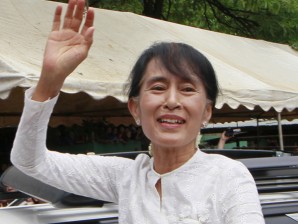Suu Kyi to deliver Nobel Peace Prize speech, 21 years after
OSLO – Myanmar democracy icon Aung San Suu Kyi was set Saturday to deliver her speech for the Nobel Peace Prize she won two decades ago, crystallising the success of her relentless struggle.
Suu Kyi’s visit to Oslo after years of house arrest is itself testimony to the past year’s sweeping political change in her Southeast Asian homeland, whose long-ruling generals have promised to follow a path to democracy.
When Suu Kyi won the honour in 1991, she could not accept it in person, fearing she would be blocked from returning to the country also called Burma where “The Lady” had become a potent symbol of non-violent defiance.
This week, back in Europe for the first time in 24 years, Western supporters and Burmese exiles are cheering her along a whirlwind tour that started in Switzerland and will also take her to Britain, Ireland and France.
In Norway, she was greeted with flowers and songs by hundreds of Burmese, many with her party’s Fighting Peacock flag painted on their faces, then dined with the country’s political leaders and royals.
Article continues after this advertisementOn Saturday, she was set to meet members of the Nobel Committee and have an audience with King Harald and Queen Sonja at the Royal Palace before delivering her Nobel lecture at Oslo City Hall from 1:00 p.m. (1100 GMT).
Article continues after this advertisementSuu Kyi – who turns 67 next week and who fell ill in Switzerland, blaming the strain of jetlag and exhaustion – said Friday that she was on a journey of “rediscovery and discovery, seeing the world with new eyes.”
The world around her has certainly changed since she learnt in 1991 that she had won the Nobel, listening to a shortwave radio, isolated in the crumbling lakeside mansion in Yangon that would be her prison for a total of 15 years.
Her husband Michael Aris and their two sons, Kim and Alexander, accepted the award on her behalf. When her husband died of cancer in 1999, Suu Kyi could not be by his side, again fearing she would not be allowed to come home.
Then, last year, the junta surprised the world with reforms that have brought cautious hope for real change, rewarded with visits since by US Secretary of State Hillary Clinton and British Prime Minister David Cameron.
Ex-general President Thein Sein has freed hundreds of political prisoners, welcomed Suu Kyi’s party back into mainstream politics, and signed ceasefires with ethnic rebel groups, leading Western nations to ease sanctions.
When she arrived in Oslo on Friday, Suu Kyi warned that “we’re certainly not at the end of the road. By no means. We are just starting out.”
“And this road is not going to be a straightforward, smooth one. There are going to be many twists and turns and there’ll be obstacles. But we’ll have to negotiate these in the spirit of national reconciliation.”
Suu Kyi’s trip has been clouded by ethnic strife at home, regional clashes between majority Buddhists and stateless Muslim Rohingya.
Fifty people have been killed and scores wounded in the clashes in Rakhine state, state media said Saturday, as the United Nations warned of “immense hardship” faced by thousands displaced by rioting.
To her many admirers, the Oxford-educated daughter of independence hero General Aung San is one of history’s great human rights defenders.
“It is not power that corrupts but fear,” she said in her most famous speech, in 1990. “Fear of losing power corrupts those who wield it, and fear of the scourge of power corrupts those who are subject to it.”
